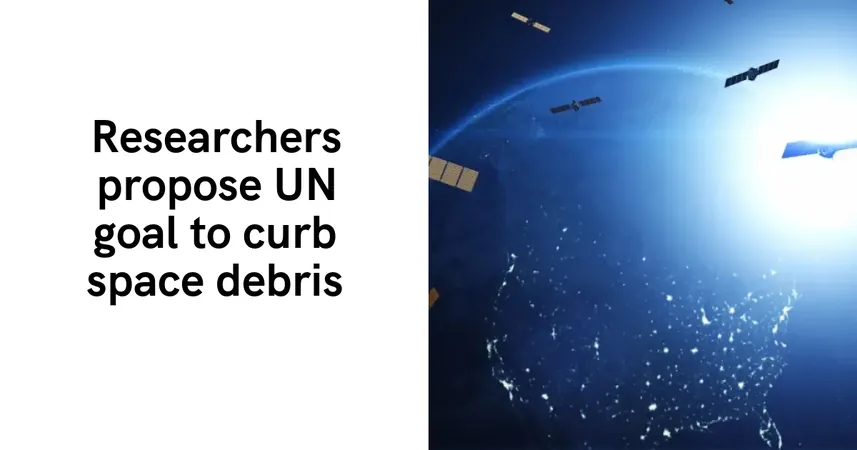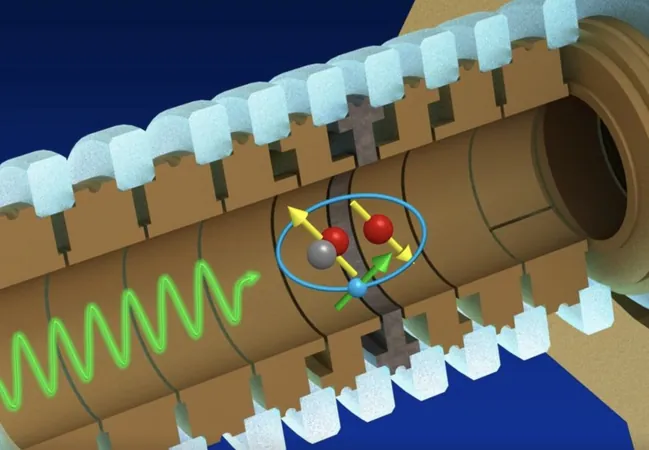
Urgent Call for Global Action: New UN Goal Needed to Combat Space Debris Crisis!
2025-01-09
Author: Mei
Urgent Call for Global Action: New UN Goal Needed to Combat Space Debris Crisis!
In a groundbreaking report released January 9, an international coalition of scientists and experts is sounding the alarm on the alarming rise of orbital debris, urging nations worldwide to include space stewardship as a critical component in the United Nations’ Sustainable Development Goals (SDGs). The addition of this new goal would establish a crucial framework to collaboratively tackle the threats posed by space junk, as the number of satellites in orbit skyrockets.
With more than 100 countries now actively participating in space activities and nearly 20,000 satellites launched since the dawn of the Space Age, the urgency of this initiative cannot be overstated. The current state of Earth’s orbital environment is vital, underpinning an estimated $469 billion worth of annual human activity, which is essential for navigation, communications, and vital ecological monitoring.
The Kessler Syndrome, a phenomenon wherein the density of objects in low Earth orbit becomes so high that collisions generate far more debris, poses a dire threat to our access to space. Experts highlight that in 2024 alone, the average number of close approaches per satellite in low Earth orbit increased by 17% year-over-year. In 2023, a staggering 2,877 satellites were launched—an increase of 15% compared to the year prior—resulting in over 12,500 spacecraft currently orbiting Earth, with more than half belonging to the Starlink broadband network.
The report advocates learning from the successes of SDG 14, which focuses on marine life, to manage space debris effectively. The same principles that helped address ocean pollution—such as international treaties, modern technology, and collaborative efforts—are now being proposed for space debris management. The concept of a 'waste hierarchy,' initially developed for ocean plastics, should be adapted for space, prioritizing prevention and reusability over cleanup efforts.
Furthermore, the authors stress the need for treating Earth’s orbit as a shared resource akin to the oceans. By establishing an 18th SDG addressing space sustainability, nations can safeguard this critical environment while ensuring that ecological sustainability translates into economic and social benefits.
The potential risks of ignoring the space debris crisis extend beyond lost satellites; they could jeopardize future space exploration and technological advancements. Effective management strategies could mirror the enforcement mechanisms of existing SDGs, using diplomatic pressure and economic incentives to foster compliance.
Despite previous calls for a legally binding treaty to protect Earth's orbital space, progress has been hampered by geopolitical tensions and diverging national interests. The path forward necessitates strong advocacy from countries committed to this vital cause, leading to unified and enforceable measures tailored to address the rapidly growing risk of orbital debris.
As we embark on this critical journey, the involvement of leading researchers from prestigious institutions like NASA, the University of Plymouth, and the Zoological Society of London adds weight to this urgent appeal for action. The time is now for the global community to come together, recognize the finite nature of our orbital environment, and take decisive steps to ensure its sustainability for generations to come. Will you join the fight to protect our space frontier?




 Brasil (PT)
Brasil (PT)
 Canada (EN)
Canada (EN)
 Chile (ES)
Chile (ES)
 Česko (CS)
Česko (CS)
 대한민국 (KO)
대한민국 (KO)
 España (ES)
España (ES)
 France (FR)
France (FR)
 Hong Kong (EN)
Hong Kong (EN)
 Italia (IT)
Italia (IT)
 日本 (JA)
日本 (JA)
 Magyarország (HU)
Magyarország (HU)
 Norge (NO)
Norge (NO)
 Polska (PL)
Polska (PL)
 Schweiz (DE)
Schweiz (DE)
 Singapore (EN)
Singapore (EN)
 Sverige (SV)
Sverige (SV)
 Suomi (FI)
Suomi (FI)
 Türkiye (TR)
Türkiye (TR)
 الإمارات العربية المتحدة (AR)
الإمارات العربية المتحدة (AR)